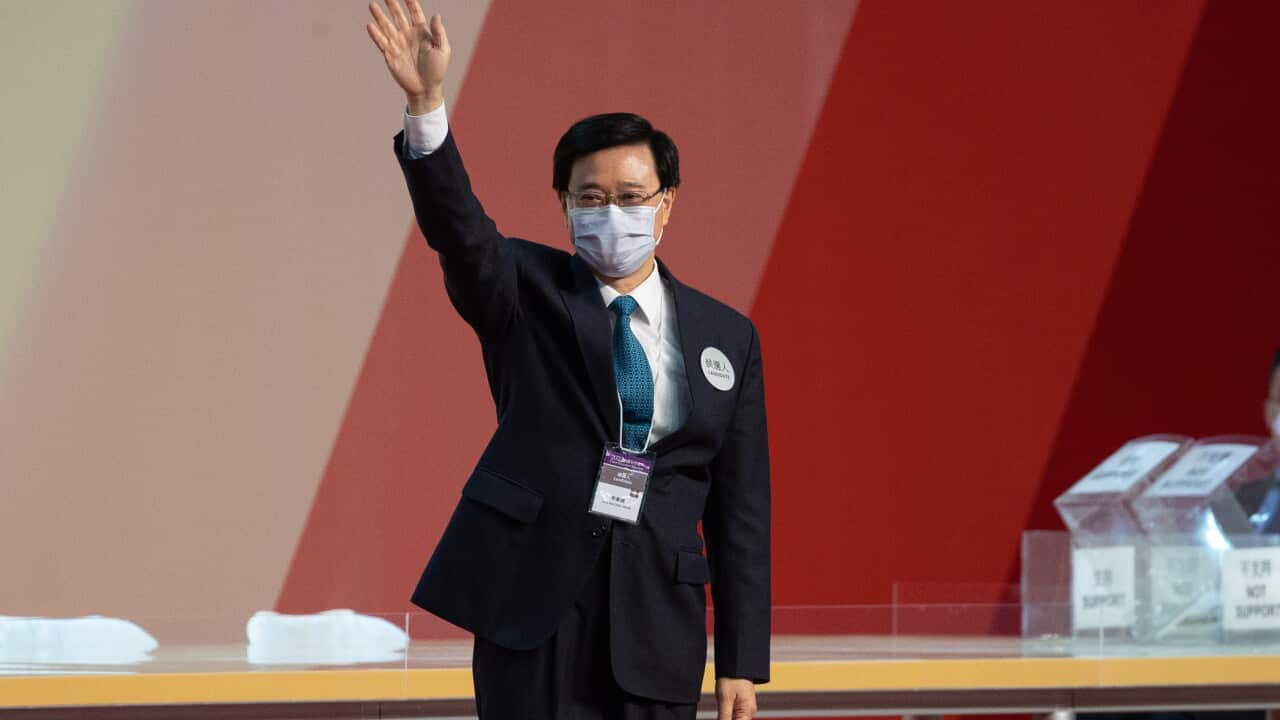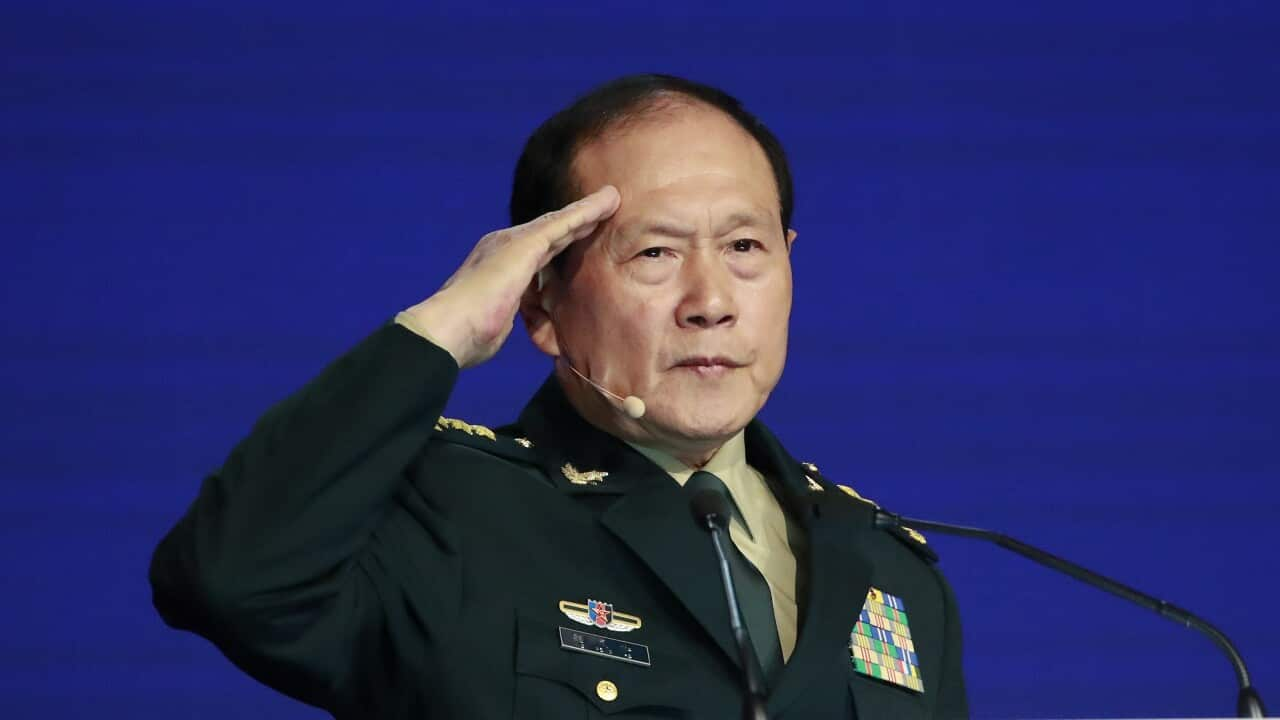Key Points
- China and Britain agreed to the handover of China in 1997, where Beijing would resume control of the city under the 'one country, two systems' principle.
- Today marks 25 years since the monumental ceremony - and many people fear that China did not keep its promise in maintaining sovereignty to Hongkongers, especially following the enactment of the national security law in 2020.
Twenty-five years ago to the day, thousands gathered on a rainy evening in Hong Kong to mark a significant ceremony that would change the course of the city forever.
Some Hongkongers felt sadness, while others saw a wealth of opportunity when Britain handed Hong Kong to Chinese rule under the promise of a "one country, two systems" policy.
"Now, Hong Kong people are to run Hong Kong. That is the promise. And that is the unshakeable destiny," were the words uttered by Hong Kong's last British governor Chris Patten.
He bid Hong Kong farewell in a sombre speech on the night before 1 July 1997 at the handover ceremony, attended by thousands and broadcast around the world.
The handover was born out of the Sino-British Joint Declaration - signed by the United Kingdom and China in 1984 - which marked the end of more than 150 years of British colonial rule.
Under the declaration, Britain agreed to hand Hong Kong back to Chinese rule which was initially ceded in 1842 after the First Opium War. In return, China promised to maintain a "one country, two systems" principle that would be put in place for 50 years - until 2047.
Meaning there is one "one China", but Hong Kong would retain its own economic, legal and administrative systems separate to mainland China.

The official proceedings of the Hong Kong handover ceremony took place on the eve of 1 July 1997. Source: Getty / Peter Turnley / Corbis / VCG
"People would hope that 'one country, two systems' can help the people in Hong Kong to achieve full democracy and to preserve the rule of law and judicial independence," a Hong Kong fellow at Georgetown University, Eric Lai, told SBS News.
Under the Basic Law, it was the ultimate aim for Hongkongers to be given the right to vote to elect the chief executive, but this has yet to be realised. This sparked the Umbrella Movement pro-democracy protests in Hong Kong in late 2014.
'Fear and doubt and uncertainty'
But as Hong Kong enters halfway into the 50-year deal, some people believe Beijing has instead instilled "fear and doubt and uncertainty into one thriving city".
That's according to Hong Kong-Australian Kevin Yam, who made the difficult decision to leave the city he called home for two decades.

Kevin Yam was a lawyer and activist in Hong Kong but recently moved back to Australia where he grew up. He harboured fears for his safety in the future if he stayed in Hong Kong.
That was until the people he loved were not around anymore.
"I was starting to see more and more and more of my friends going to jail or going in exile," he said.
Now he's back in Australia, in part due to the strict COVID-19 restrictions that remain in place in Hong Kong, and his fear of falling victim to the sweeping national security law that was enforced in 2020.
"While I'm not in any immediate danger, now, I think, you know, in a few years' time, it could be my turn."
'Chilling effect' of national security law
According to Mr Lai, the law "actually allows the authorities to do whatever they want to".
"[The law allows authorities] to crack down on civil society, and to crack down on the pro-democracy movement with the legal terms," he said.
After being passed by the Chinese Communist Party (CCP) on 30 June 2020, the national security law meant that people could be charged with secession, subversion, terrorism or collusion with foreign forces against Hong Kong and China.
Thousands of pro-democracy politicians, journalists, activists and civilians have since been arrested under the law. Today, . They are either jailed, in self-exile, or disqualified from standing for office.

Millions of pro-democracy protesters embarked onto Hong Kong streets in 2019-20, demanding Beijing and the Hong Kong government to withdraw its controversial extradition bill. Source: AAP / AP / Kin Cheung
Beijing's imposition of the national security law helped propel a new wave of Hongkongers leaving the city to emigrate across the world, swelling the diaspora with those who feel dispossessed by Chinese rule, echoing similar trends prior to the 1997 handover.

Many protests during the 2019-20 pro-democracy movement turned violent after authorities clashed with civilians. Source: Getty / Anadolu Agency
"Hong Kong has long been one of those places where, if you leave it to its own devices, its people are self-reliant. They are industrious, they're entrepreneurial, and they've got a can-do spirit," he says.
"But Beijing has somehow managed to bury all of that, and instead instil fear, and doubt and uncertainty into one thriving city."
The handover so far: a success or betrayal?
During the early years after the handover, Mr Yam believes, bar a few challenges, it "would not have been unfair to say that it was a success".
But after the national security law was enforced, everything he believed about the autonomy of Hong Kong was decimated.
"I think it's really sad that Beijing has managed to stuff up a place that's very difficult to stuff up."
Mr Lai said that the national security law stifles pro-democracy under the guise of vague legal terminology and has betrayed the values that underpinned the "one country, two systems" policy that was promised 25 years ago.
He says it's a "dramatic shift" from how people expected to live 25 years ago - and those freedoms are likely to get tighter in the future, under CCP rule.
"It is foreseeable that many rights and freedoms people have enjoyed since the handover will be fading out, one by one," Mr Lai said.
But the former leader of the city, Leung Chun-ying, said Hongkongers still retained the same rights as they did 25 years ago.
"We are a liberal and pluralistic society. People are free to express openly their different views and strive for personal and sectoral interests," he told the South China Morning Post.
Hong Kong 'reborn of fire': Xi Jinping
Chinese President Xi Jinping has offered a different perspective, boasting about the success of the "one country, two systems" policy on his arrival with his wife Peng Liyuan in Hong Kong on Thursday. It's his first visit to the city in five years and after the crackdown by authorities its pro-democracy movement.

China's President Xi Jinping said Hong Kong was "reborn" in a speech leading up to the 25th anniversary of Britain's handover of Hong Kong to China. Source: AAP, AP / Selim Chtayti
"After the storms, Hong Kong has been reborn of fire and emerged with robust vitality."
While he cited challenges that were overcome in Hong Kong, he didn't make explicit reference to the authoritarian crackdown on protests in 2019-20.
Mr Xi reportedly stayed in the Chinese city of Shenzhen on Thursday night - 15 minutes away from Hong Kong by high-speed train - and will return to the city on Friday morning to attend the 1 July events. This includes swearing in the city's new leader John Lee.
Did Britain fail its former colony?
Twenty-five years ago, the 28th - and last - British governor, Mr Patten, was cautiously hopeful for the future of the city that he led.
"For Hong Kong as a whole, today is cause for celebration, not sorrow," he said during his handover ceremony speech.

Former British governor Chris Patten wipes his eye during an investiture ceremony in Hong Kong on June 29, 1997, his last days in Hong Kong prior to the colony's handover to China. Source: AAP / AP / Vincent Yu
"China has ripped up the Joint Declaration and is vengefully and comprehensively trying to remove the freedoms of Hong Kong because it regards them as a threat, not to the security of China but to the ability of the Chinese Communist Party to hang on to power," Mr Patten recently said.
And, as for Mr Yam, he believes that Britain, too, has "definitely failed Hong Kong".
"When the Hong Kong handover negotiations are happening, both London and Beijing have excluded Hongkongers from the negotiations," Mr Yam said.
Mr Patten insisted his country did not betray Hong Kong.
"Whatever we had done in terms of changes before 1997 were unlikely to have affected the way that the Chinese Communist Party behaved after the arrival of Xi Jinping in the top job," he said.

Ceremonial scenes for the official handover of Hong Kong to China took place in the pouring rain. Source: Getty / Mirrorpix
While these "escape paths" have been acknowledged by Mr Yam, it doesn't compare to living safely and freely in your own homeland.
"Ultimately, that's a second-best choice for Hong Kong," he said.
"Most of us Hongkongers would much prefer to have stayed in Hong Kong, made our family there, made our living there and create and continue to make a great city."
With AFP.













